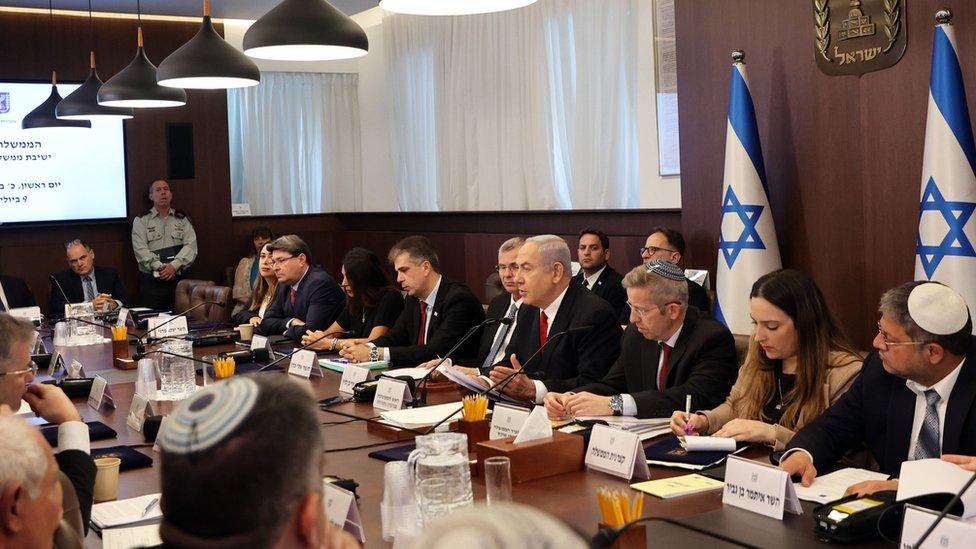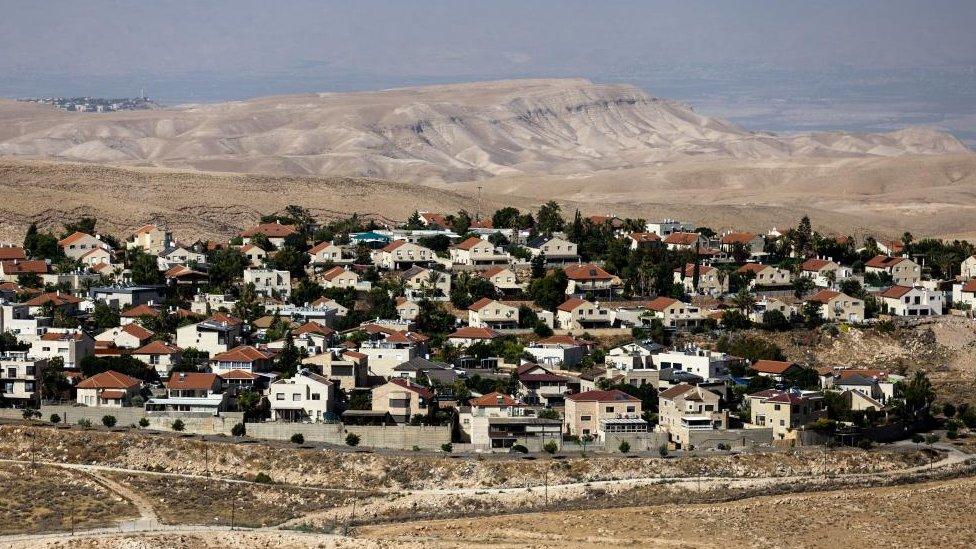Biden criticises 'most extreme' ministers in Israeli government
- Published

Prime Minister Benjamin Netanyahu chaired a weekly cabinet meeting in Jerusalem on Sunday
Israeli ministers have criticised the US president, after he said their government contained "some of the most extreme" members he had ever seen.
Joe Biden told CNN that Prime Minister Benjamin Netanyahu had "problems in terms of his coalition", external when asked why he had yet to visit the White House.
Mr Netanyahu's nationalist-religious coalition includes far-right parties.
The leader of one of them, National Security Minister Itamar Ben-Gvir, denied that he was an extremist.
Mr Ben-Gvir, who has convictions for racist incitement and supporting a terrorist organisation, also warned Mr Biden that he "needs to realise that we [Israel] are no longer a star on the American flag".
Energy Minister Israel Katz, a member of Mr Netanyahu's Likud party, said the US president "knows the rules of democracy".
He also noted a decision by Mr Netanyahu's security cabinet on Sunday to "act to prevent the collapse of the Palestinian Authority". Mr Ben-Gvir voted against the move, while another far-right minister abstained.
Mr Biden also said in the CNN interview that the Palestinian Authority, which governs parts of the occupied West Bank that are not under full Israeli control, had "lost its credibility" and "created a vacuum for extremism among the Palestinians".
"So, it is not all Israel now in the West Bank, all Israel's problem. But they are a part of the problem, particularly those individuals in the cabinet who say: 'We can settle anywhere we want; they have no right to be here, etc.'"
"We are talking with them regularly, trying to tamp down what is going on. Hopefully, Bibi will continue move toward moderation and change," he added, using the Israeli prime minister's nickname.
Mr Netanyahu returned to power at the end of December, leading the most right-wing government in Israel's history.
It immediately faced condemnation from Palestinians and human rights groups for stating that the Jewish people had an "unquestionable right to all areas of the Land of Israel", including the occupied West Bank.
Since then, the government has advanced plans for 13,000 new housing units at settlements across the West Bank, according to the Israeli anti-settlement group Peace Now. That is three times as many as in the whole of last year.
Most countries deem the settlements, which are built on land captured by Israel in 1967 in the Middle East War, to be illegal under international law, although Israel disagrees.
The Biden administration warned last month that the settlement expansion was undermining the viability of the two-state solution to the Israel-Palestinian conflict - the long-standing international formula for peace - as well as exacerbating tensions and harming trust between the two parties.
The past seven months have also seen a surge of deadly violence in the region.
On Monday, the Israeli military said its troops had shot dead a Palestinian man who threw a grenade and opened fired at them near the village of Deir Nidham.
The incident came a week after the military launched what it called "extensive counterterrorism effort" in the city of Jenin. Twelve Palestinians and one Israeli soldier were killed during the two-day operation, which involved hundreds of ground forces backed by drone strikes.
- Published27 June 2023
